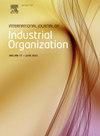特许经营对商店、竞争对手和消费者的影响
IF 1.7
3区 经济学
Q2 ECONOMICS
International Journal of Industrial Organization
Pub Date : 2024-01-26
DOI:10.1016/j.ijindorg.2024.103055
引用次数: 0
摘要
一家休闲餐饮连锁店在被一家公司收购后,将其公司所有的门店都出售给了加盟商。我利用这种特许经营状况的变化来估计特许经营的影响。我使用一个基于效用的选择模型来预测德克萨斯州所有售酒酒吧和餐馆在 10 年内的酒类销售情况。利用该模型,我发现特许经营餐厅的收入增加了 7%。这一收入增长的很大一部分是以竞争对手的全国连锁店为代价的。我还发现,特许经营一家商店所产生的消费者效用收益,相当于从个人住所到商店的距离缩短 2.8 英里所带来的收益。本文章由计算机程序翻译,如有差异,请以英文原文为准。
The effects of franchising on stores, competitors, and consumers
Following a corporate acquisition, a casual dining chain sold all of its company-owned stores to franchisees. I exploit this change in franchise status to estimate the effects of franchising. I use a utility-based choice model to predict alcohol sales for all liquor-selling bars and restaurants in Texas over a 10-year period. Using this model, I find that franchising a restaurant increases its revenues by 7 percent. A substantial share of this revenue increase comes at the expense of competing national chains. I also find that franchising a store produces a consumer utility gain equal to the gain that would result from a 2.8-mile reduction in distance from the individual's home to the store.
求助全文
通过发布文献求助,成功后即可免费获取论文全文。
去求助
来源期刊
CiteScore
2.50
自引率
6.70%
发文量
48
审稿时长
77 days
期刊介绍:
The IJIO is an international venture that aims at full coverage of theoretical and empirical questions in industrial organization. This includes classic questions of strategic behavior and market structure. The journal also seeks to publish articles dealing with technological change, internal organization of firms, regulation, antitrust and productivity analysis. We recognize the need to allow for diversity of perspectives and research styles in industrial organization and we encourage submissions in theoretical work, empirical work, and case studies. The journal will also occasionally publish symposia on topical issues.

 求助内容:
求助内容: 应助结果提醒方式:
应助结果提醒方式:


